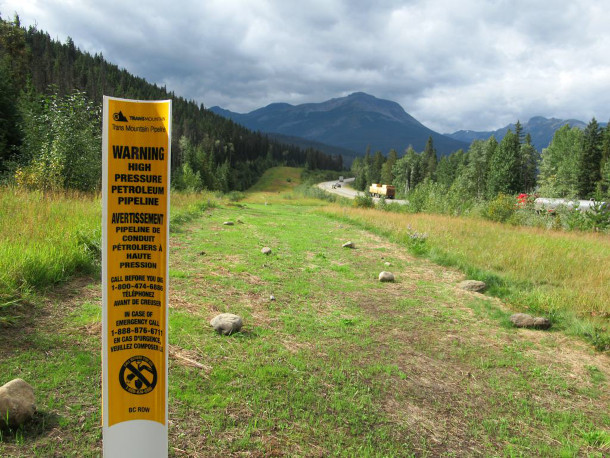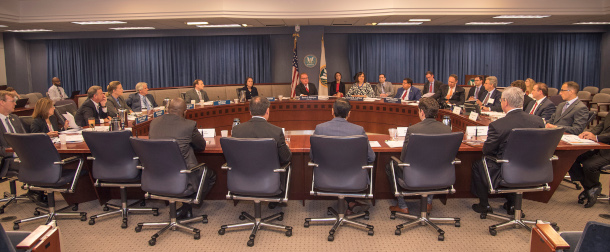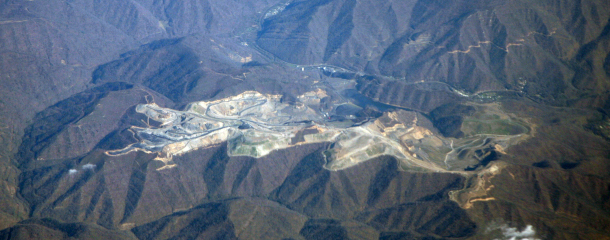Beyond the Headlines
Air Date: Week of February 25, 2022

The Trans Mountain Pipeline in the Western Canadian province of Alberta. (Photo: David Stanley, Wikimedia Commons, CC BY 2.0)
This week, Environmental Health News Editor Peter Dykstra and Host Steve Curwood discuss the Canadian government’s decision to stop devoting taxpayer money to the Trans Mountain Oil Expansion. Also, the Federal Energy Regulatory Commission will now account for carbon emissions and environmental justice in its pipeline decisions. And from the history books, in 1972, the story of the more than 130 million gallons of coal contaminated wastewater that ruptured a retaining wall in Buffalo Creek, West Virginia, killing 150 people and destroying 4000 homes.
Transcript
CURWOOD: With me now on the line from Atlanta, Georgia is Peter Dykstra. Peter's an editor with Environmental Health News, that's EHN.org and DailyClimate.org. And he usually talks to us about what's going on beyond the headlines. How about it, Peter, what do you see this week?
DYKSTRA: Well, I bring you a couple of stories laden with fossil fuels. The first one is something that clean energy advocates will consider to be a pretty strong victory. Canada has decided to stop funding one of the pipelines that is dedicated to making their tar sands project a success. The Trans Mountain oil line expansion is now going to cost according to the company 70% more. That money comes from the Canadian government, they've decided that their funding, for now, is at an end. It could be mortally bad news for oil sands.
CURWOOD: But wait, Peter, I mean, right now with conflict in Eastern Europe, the price of oil is in the neighborhood of 100 bucks a barrel. Maybe all that tar sands oil is in fact looking to get to market.
DYKSTRA: Yes, another gift from the fossil fuel economy. But this still could be a death blow for any viability for the tar sands in Alberta, roundly criticized for not only adding to our carbon dependence, but just paint a really, really dirty way to generate energy. The pipeline would have run from Alberta, to Vancouver on the west coast of Canada, to help as an export point to send oil to China, India, Japan, and other countries on the Pacific Rim that are still planning to be dependent on fossil fuels.
CURWOOD: And Peter, you have more for us on pipelines?
DYKSTRA: Yeah, a bureaucratic breakthrough in the United States involving FERC. That is an acronym for the Federal Energy Regulatory Commission. They're charged with regulating pipelines, other things like dams and dam removal. But FERC has announced that it's going to take into consideration emissions and environmental justice into any of its decisions on licensing or not licensing an energy facility. There's no US federal agency that goes nearly this far.

A joint meeting between the Nuclear Regulatory Commission and the Federal Energy Regulatory Commission to converse on the dependability of the electric grid, cybersecurity, and nuclear power plant malfunctions at FERC Headquarters in Washington, D.C on June 7th, 2018. (Photo: Nuclear Regulatory Commission, Wikimedia Commons, CC BY 2.0)
CURWOOD: Yeah, the lawyers won't like it, because fighting each pipeline case by case has kept lawyers, you know, pretty well taken care of financially, even now. If the Federal Energy Regulatory Commission can say wait, this pipeline is not gonna help us when it comes to environmental justice and or greenhouse gas emissions. Hey, there won't be the litigation that the lawyers were seeing before.
DYKSTRA: I kind of think lawyers are always gonna find a way to keep themselves busy.
CURWOOD: Hey, let's take a look now back in history, tell me what you see.
DYKSTRA: February 26, 1972. We're talking about the 50th anniversary of a disaster at Buffalo Creek, West Virginia. There was heavy rainfall for most of the month of February, and an estimated 132 million gallons of coal-tainted wastewater burst through a retaining wall downhill toward several small towns. Remember, storing your toxic waste uphill from small towns is not a good idea. Several small towns were destroyed. 125 people died and 4000 were left homeless. This tragedy put a spotlight on abusive strip mining practices in the coal industry. It's a little bit different today, but probably just as dangerous.

This photo illustrates Kentucky Appalachia and an exhaustive mountaintop removing mining operation. (Photo: Doc Seals, Wikimedia Commons, CC BY 2.0)
CURWOOD: Well, yeah, and coal-tainted wastewater is maybe not such a big deal these days. But on the other hand, once that coal is burned, a lot of these companies will take the coal ash and put it in impoundments and those have broken through and polluted streams and towns right Peter?
DYKSTRA: Yeah, coal has trace elements of several toxic heavy metals. When you burn the coal, much of the toxicity remains in coal ash. Many coal burning power plants, including closed coal power plants have coal ash ponds and lagoons on their property. Inspections have said that many of these facilities are poorly regulated and dangerous and the dams and retaining walls that are there to keep them in are not necessarily in good shape.
CURWOOD: Thanks, Peter. Peter Dykstra is an editor with Environmental Health News, that's EHN.org and DailyClimate.org. We'll talk to you again real soon.
DYKSTRA: You bet, Steve. Thanks a lot and we'll talk to you soon.
CURWOOD: And there's more on these stories on the Living on Earth webpage, that's LOE.org.
Links
Reuters | “Canada Govt to Stop Funding Trans Mountain Oil Line Project as Costs Soar 70%”
Grist | “A Federal Permitting Agency Will Take Emissions, Environmental Justice Into Account”
Living on Earth wants to hear from you!
Living on Earth
62 Calef Highway, Suite 212
Lee, NH 03861
Telephone: 617-287-4121
E-mail: comments@loe.org
Newsletter [Click here]
Donate to Living on Earth!
Living on Earth is an independent media program and relies entirely on contributions from listeners and institutions supporting public service. Please donate now to preserve an independent environmental voice.
NewsletterLiving on Earth offers a weekly delivery of the show's rundown to your mailbox. Sign up for our newsletter today!
 Sailors For The Sea: Be the change you want to sea.
Sailors For The Sea: Be the change you want to sea.
 The Grantham Foundation for the Protection of the Environment: Committed to protecting and improving the health of the global environment.
The Grantham Foundation for the Protection of the Environment: Committed to protecting and improving the health of the global environment.
 Contribute to Living on Earth and receive, as our gift to you, an archival print of one of Mark Seth Lender's extraordinary wildlife photographs. Follow the link to see Mark's current collection of photographs.
Contribute to Living on Earth and receive, as our gift to you, an archival print of one of Mark Seth Lender's extraordinary wildlife photographs. Follow the link to see Mark's current collection of photographs.
 Buy a signed copy of Mark Seth Lender's book Smeagull the Seagull & support Living on Earth
Buy a signed copy of Mark Seth Lender's book Smeagull the Seagull & support Living on Earth

